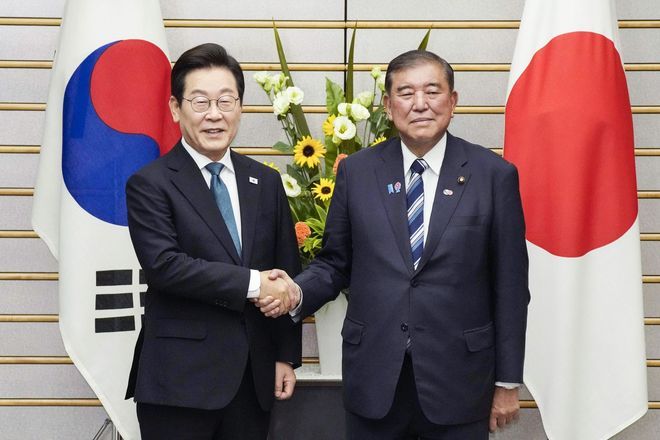Japan and South Korea are such close neighbors that it takes only a two-hour plane ride to travel from one capital to the other.
Regardless of the circumstances surrounding bilateral ties, establishing a relationship in which the leaders visit the other nation and exchange words will construct a better future for both sides.
South Korean President Lee Jae-myung visited Tokyo for a meeting with Prime Minister Shigeru Ishiba. It was Lee’s first visit to Japan since becoming president in June.
The two leaders discussed expanding cooperation over a wide range of areas including the economy, national security and culture.
They also came up with a measure to promote exchanges among the younger generations.
In the past, Lee directed sharp criticism at Japan over its historical understanding.
As a result, some Japanese officials were concerned that the Japan-South Korea relationship would worsen once Lee became president.
But after taking office, Lee has displayed a stance emphasizing ties with Japan by calling for pragmatic diplomacy and showing an eagerness to resume mutual visits by leaders to the other nation.
An expression of that stance was his decision to visit Japan first rather than the United States.
Japan and South Korea face common issues such as a rapidly graying population and a falling birth rate, fragmentation of society, concentration of people and business in the capital area and the accompanying decline of rural regions.
As such, it should be possible to share knowledge about resolving such issues and create a relationship in which both sides can learn from the experience of the other as it sought out policy measures to deal with those issues.
One result of the summit was the agreement to pursue discussions between the two governments to come up with solutions for common problems.
There is greater significance for Japan in seeking cooperation with South Korea.
The international situation has changed dramatically, with the United States under President Donald Trump taking an increasingly self-centered stance on trade and national security.
In addition, the Asian security environment continues to evolve as demonstrated by North Korea’s development of nuclear weapons and ballistic missiles and China’s increased defense spending.
Other major international issues are the Russian invasion of Ukraine and the military conflicts in the Middle East.
In addition, Trump has hinted at seeking greater expenditures from allies such as Japan and South Korea for defense and hosting U.S. bases in their lands.
There is also the nagging possibility that Trump might make some ill-considered deal with North Korea.
Amid that background, South Korea’s importance for Japan increases as a nation that shares common universal values such as freedom and democracy.
There are still concerns within the two nations about differences in historical understanding related to Japan’s past colonial domination of the Korean Peninsula.
Lee has said that past bilateral agreements must be respected and that it was important to move toward the future while squarely facing the past.
But Japan will likely be asked to face up to its past and to take into consideration the complicated emotions that are still strong in South Korea.
This year marks the 60th anniversary of the normalization of relations between Japan and South Korea.
While there have been ups and downs, the two nations have deepened ties, demonstrated by the fact that about 12 million visitors annually travel to the other nation.
We hope continued dialogue and the fostering of trust between the two leaders will lead to a further strengthening of ties.
–The Asahi Shimbun, Aug. 24


AloJapan.com